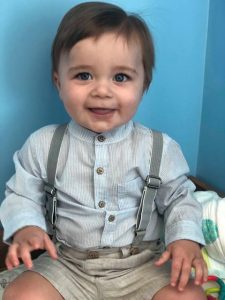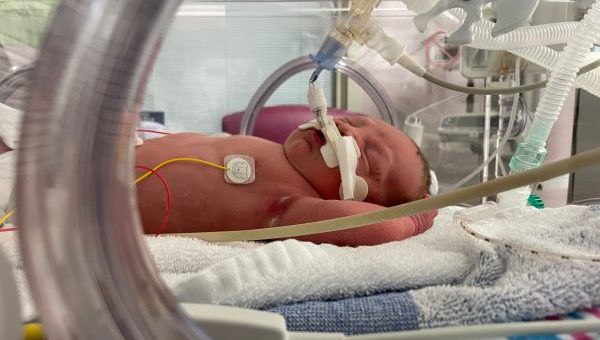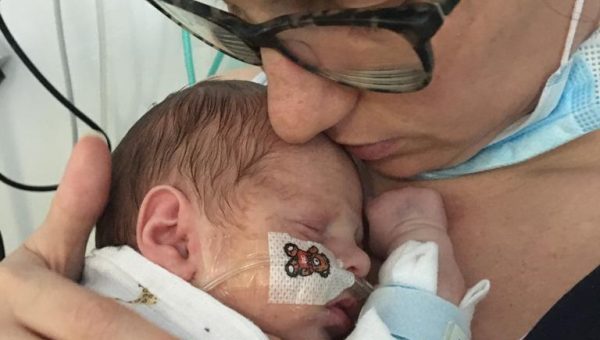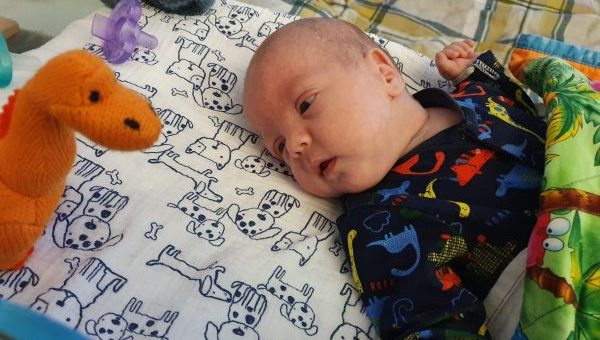Having suffered from gestational diabetes when I was pregnant with my first son, Jenson, it came as no real shock to me when I was diagnosed with the same condition six weeks into my pregnancy with Leo. I was told I would need to take insulin and metformin tablets to regulate my blood sugar for the remainder of the pregnancy, but this didn’t worry me too much and with regular check-ups time passed smoothly until I reached 38 weeks. At this point I could not have imagined that my newborn baby would need to be transferred to a hospital far from home and a charity I had never heard of, The Sick Children’s Trust, would come to our aid. But this is what happened.

I arrived at Princess Alexandra Hospital in Harlow at 38 weeks pregnant to be induced. For five days we waited for Leo, but he didn’t want to come out. When he finally did arrive, I watched my partner, Aaron, cuddle our baby boy and give him his first bottle. I was overwhelmed with love for Leo. However, just minutes later he began to make funny noises. One of the midwives examined him thinking he might just be suffering from low blood sugar levels. But he wasn’t. She called the paediatrician over immediately and he checked Leo’s oxygen levels. Aaron had gone to pick up Jenson from his Nan Anita’s house so I was all by myself. The first results showed very low oxygen saturation levels, but because the machines were new, he did the test again, telling me it must be an inaccurate reading. When the second test came back with the same result it was clear to everyone that something was very wrong. Before I knew what was happening Leo had been raced up to the neonatal intensive care unit (NICU) leaving me terrified and feeling very alone on the maternity ward.
An X-ray of Leo’s chest showed that he had suffered from a pneumothorax when he had taken his first breath. This meant that a build-up of air in the space just outside one of his lungs had caused it to collapse, tearing a hole and meaning it could not inflate. It sounded so serious to us, but the paediatrician reassured us both that with the correct treatment, it would heal within a few days. We were relieved, but still very worried. A few hours later, and with Leo stable on oxygen in NICU, Aaron had to leave Jenson with his Nan again. My son hadn’t seen his Mummy for over five days.
Leo began to crash as his oxygen levels dropped further. The nurse tried to reassure us by telling Aaron and I he wasn’t going to die, but he was seriously ill and we knew he required lifesaving treatment. Leo had to have a chest drain because there was so much air built up around his lungs. At this point he was put into an induced coma and ventilated to help him breathe. The next morning he was transferred by emergency to The Rosie Hospital in Cambridge for further specialist treatment. Aaron and I followed behind the ambulance, not even thinking about where we might stay once we arrived.
“In the middle of the night, when I couldn’t sleep, I was able to walk my milk up to Leo on the ward and sit with him so he knew he wasn’t alone.”
As soon as we got to The Rosie Hospital we heard about The Sick Children’s Trust. A nurse explained that it was a charity that supported parents like us when they had a seriously ill child in hospital by providing them with free accommodation. She directed us to Chestnut House, just below NICU, two minutes from where Leo was being treated. Abi, the House Manager, met us at the door and showed us around. Even in my current state I could appreciate the impact being able to stay in the house had on families, especially when Abi said there was room for Jenson too. By the end of that first day, and with Leo settled on NICU, we had the use of a private room with two single beds, a cot for Jensen and an en suite bathroom.
Chestnut House became our home whilst we waited for Leo’s pneumothorax to seal itself. He had to have three blood transfusions during that time and, when his infection levels came back sky high, the doctors worried he had contracted meningitis. Fortunately he hadn’t and, after a couple of days, he was taken off the ventilator. He was still on high flow oxygen, but began to breathe by himself. I can’t tell you the relief Aaron and I felt when we heard him cry properly for the first time.
The support of the house team was invaluable. Abi and the staff were lovely – nothing was too much trouble and they knew exactly what to say to us. We also spoke to other families with babies on NICU and it was a comfort to eat breakfast together in the kitchen and share our updates. Jenson made friends with another little girl and they were able to have fun in the playroom together, which felt miles away from the clinical and sterile hospital environment. Practically, for me, there were breast pumps in the house, which meant I was able to express in the privacy of our room. In the middle of the night, when I couldn’t sleep, I was able to walk my milk up to Leo on the ward and sit with him so he knew he wasn’t alone.
It wasn’t long before Leo was well enough to be transferred back to Harlow and we said our grateful goodbyes to everyone at Chestnut House. Leo was discharged at 12 days old and then at 12 weeks old he was given the all clear. We are extremely grateful to the doctors, nurses and midwives for everything they did for Leo – without them he wouldn’t be with us today. Although he is prone to chest infections and suffers with baby asthma, Leo has thrived ever since. He is such a happy, beautiful and relaxed baby. His first birthday in May did bring all the memories flooding back, which was tough, but I channelled my feelings into fundraising by setting up a donation page on Facebook fundraiser for The Sick Children’s Trust and raising £210 to thank them for what they did for my family during our time of need.
Katie Giles, Leo mum.


